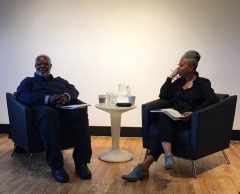 Ali Berkok – Immersion and Connection at the 2018 Guelph Jazz Festival Colloquium
Ali Berkok – Immersion and Connection at the 2018 Guelph Jazz Festival Colloquium
A Reflection from Emerging Scholar Ali Berkok, on the 2018 Colloquium: Hovering at the Edge: Words, Music, Sound, and Song
What a privilege to be accepted into the Emerging Scholars Program. Every year I plan to attend the Guelph Jazz Festival and Colloquium, but, due to my early-September teaching schedule, I rarely make it out to as many events as I want to. This year I cleared out a few days to really drink deep the well, and the Emerging Scholars program offered the organizational scaffolding to help me reach the immersion I was after.
I met friends, old and new. Guelph Jazz Festival Artistic Director Scott Thomson (of course) was around, as well as the friendly old mugs of Joe Sorbara, Alan Stanbridge, and Rob Wallace. Among new friends were fellow emerging scholar Marc Hannaford, and guest speakers Sara Villa, Paul Watkins, Vilde Aaslid, and Meta DuEwa Jones. They were, in various combinations, participants in round tables loosely focused on music and language. Like jazz, these and other round tables throughout the week, began with a prompt for players to extemporize on. It is a testament to their intelligence that the openness of the round table topics was not an excuse for meandering. Instead, they left me thinking hard on intersections between those sounds that come out of our instruments and the sounds that we use to speak with each other.
Over the span of a few days, I was able to eat, drink, attend concerts, and discourse with this unruly lot. It is utterly exciting to get to know the young minds working in the academy. They set their minds to knowledge grounded in true curiosity, intersectional social justice, and a love of music. While they all put forth solid arguments and compelling ideas, they also couldn’t hide the deep love of the kind of jazz and improvised music that brought everyone to the Festival and Colloquium; a nerdy curiosity befitting of any lover of the music.
Other standout events included a Friday morning interview with Dionne Brand, whose generous insight into her work prompted me to pick up a copy of her book Theory, whose main character, like myself. is a 39-year old struggling with their dissertation. Brand further demonstrated in her work how the line between poetry, music, and textual communication is not so clear.
A musical highlight for me was Augustí Fernández’s solo piano set on Thursday. With all parts of the piano, he created a coherent textural narrative throughout long improvisations. Each section used a spare few aspects of the piano (inside and out) so as not to overwhelm with information and to leave plenty of spaces to travel to.
William Parker’s Saturday morning set offered me an opportunity (and this is blasphemous for a Toronto musician as old as I am) to see him for the first time. I was riveted to the range of sound and ideas he put forward, and was drawn into his musical story.
As I had hoped, the Emerging Scholars program put me in connection with an abundance of ideas, names, and works—enough to research for years to come.
Inspired by the initiative developed by our friends and colleagues at the ArtsEverywhere Festival, and in partnership with the University of Guelph, the Emerging Scholars program offers scholars from all levels of study the opportunity to participate and engage with participants in our Colloquium program. They also receive complimentary attendance at two ticketed Guelph Jazz Festival performances, an intimate “Scholar’s Dinner” with Colloquium presenters, artists and participants, and an opportunity to publish their writing about their Festival and Colloquium insights on the IICSI website.







